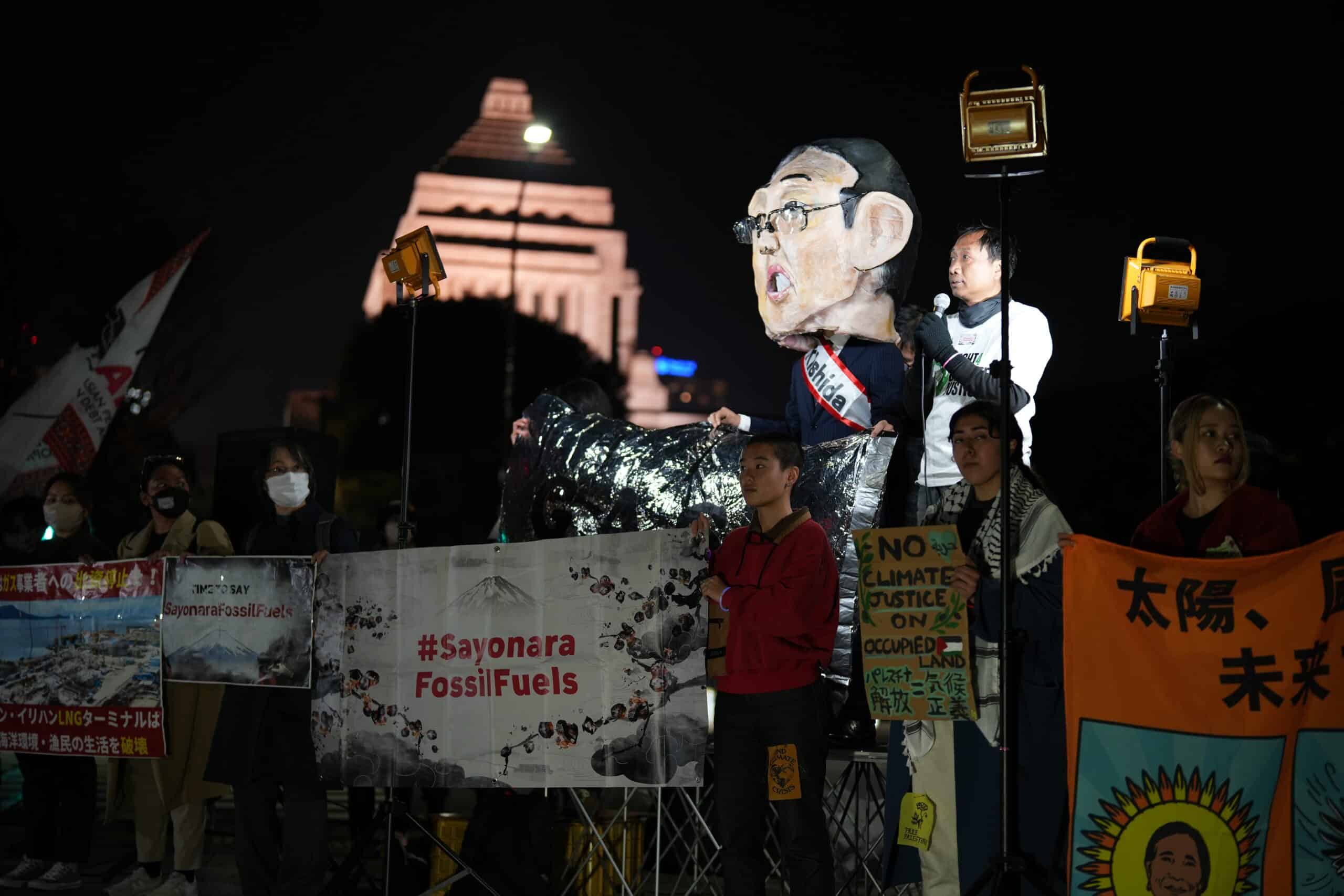
December 18, 2023 (Tokyo) – Today, leaders of the Association of Southeast Asian Nations (ASEAN) member states, Australian Prime Minister Anthony Albanese, and Japanese Prime Minister Fumio Kishida announced the Asia Zero Emission Community (AZEC) Leaders’ Joint Statement.
The leaders convened the community’s first summit at the end of the three-day ASEAN-Japan 50th anniversary commemorative summit held in Tokyo from December 16-18.
Civil society groups denounced the final statement, which recognizes “various and practical pathways towards carbon neutrality/net-zero emissions” and recognizes the need to use gas, ammonia, biomass, hydrogen and nuclear, for greenwashing fossil fuel use in Asia.
Since its announcement in January 2022, the Kishida administration has pushed the Asia Zero Emissions Community (AZEC), which is part of Japan’s larger climate “Green Transformation” strategy.
Japan has pledged up to 8 billion USD to AZEC countries until 2030 for energy projects including renewable energy, hydrogen, ammonia, and carbon capture and storage (CCS). In addition, Japan has signed approximately 70 MoUs with AZEC countries since the AZEC Ministerial Meeting in March up until the summit, according to Japan’s Ministry of Economy, Trade and Industry, including those on renewable energy as well as LNG, CCS, and ammonia, biomass and hydrogen co-firing.
Critics say this framework, in name, supports decarbonization in Asia but, in reality, encourages reliance on LNG and other fossil fuel-based technologies, which is not aligned with the region’s climate goals. At the COP28 Summit in Dubai earlier this month, the Japanese government received a Fossil of the Day Award from civil society groups, a satirical award that exposes countries pushing for continued fossil fuel use.
Civil society groups across Asia (Bangladesh, India, Indonesia, Japan, and the Philippines), as well as groups in Australia and the US, held 15 actions leading up to the Summit, calling on ASEAN leaders to reject Japan’s dirty energy plans for the region and demanding Japan to shift its support for fossil fuels to renewable energy sources like wind and solar. The groups also stood in solidarity with communities that are already reeling from the impacts of Japan’s fossil fuel investments in Asia and globally.
Statements from civil society:
Lidy Nacpil, Coordinator, Asian People’s Movement on Debt and Development:
“The people and communities of the Global South have long suffered the impacts of coal, gas and oil projects imposed on them. Local communities suffer sickness, displacement and loss of livelihoods. Local ecological systems are damaged. And now people are experiencing devastating impacts of climate change due to the excessive greenhouse gas emissions which have accumulated in the atmosphere from the use of fossil fuels. We will not let our opportunity for a fossil-free future be derailed by false solutions promoted by the Japanese government and Japanese corporations such as Fossil Gas, Hydrogen, Ammonia and CCS plants. We resist all False Solutions and Fossil Gas Expansion. Japan should put the needs of the people and planet above its pursuit of profits.”
Rere Christanto, Campaign Manager on Mining and Energy at WALHI:
“There is already a lot of evidence of losses due to the use of fossil fuels in Indonesia. Hundreds of thousands of people are reported to have died due to air pollution caused by coal-fired power plants, losses from this damage could reach USD 210 billion, 2 hectares of rainforest were cleared as coal mining areas, and hundreds of hectares of residential areas were submerged in mud due to gas drilling operations. We refuse to be a playground for Japan’s efforts to extend the use of fossil energy through the use of co-firing biomass, hydrogen, ammonia, CCS/CCUS, and LNG.”
Gerry Arances, Executive Director, Center for Energy, Ecology, and Development:
“Japan is the biggest source of financing for the gas and LNG boom in Southeast Asia, and the biggest proponent of dangerous distractions that risk tying the region to decades more of fossil fuel dependence. Southeast Asia is already on the cusp of a renewable energy transition, with massive plans for renewables that chart the way to a 1.5C-aligned energy shift. But Japan is insisting on retaining fossil fuel-based energy and blatantly disregarding our best interests as vulnerable peoples. We are being dragged deeper into climate catastrophe. Japan and ASEAN held this gathering and are launching the AZEC statement supposedly in celebration of 50 years of friendship – what a good friend Japan is indeed, digging a climate grave on our behalf.”
Hiroki Osada, Campaigner, Friends of the Earth Japan:
“Asia Zero Emission Community is all about Japan’s promotion of fossil gas and false solutions such as hydrogen, ammonia co-firing and CCS. This is nothing but an attempt to bind Southeast Asia – which is abundant with renewable energy potential – with absolutely unnecessary fossil fuel infrastructure, which makes no sense in terms of addressing the climate crisis, economic viability, and energy access. Profits only go to big Japanese fossil companies, inflicting damages on the local community and environment. Japan should stop this biggest greenwashing scheme of the century and support the region for a transition to community-based renewable energy.”
Novita Indri, Energy Campaigner, Trend Asia:
“The ASEAN-Japan summit is nothing more than a forum to promote the deployment of false solutions as part of the energy transition, undermining efforts to decarbonize and meet global climate commitments. Indonesia, as one of the co-initiators of AZEC, should have played a role in ensuring that false solutions, such as co-firing, were not included in the energy transition, and that countries phased out fossil fuels entirely, including gas. But Indonesia has failed to fulfill this role and it did the opposite. There are concerns that, as a result of this summit and the start of AZEC, Asia may accelerate the global temperature rise, exacerbating the climate crisis and failing to achieve the Paris Agreement goals.”
Hikmat Soeriatanuwijaya, Senior Partnership and Outreach Officer, Oil Change International:
“Japan’s false solutions trick is hijacking the just and equitable energy transition we rightfully deserve. Japan promotes fossil fuel-based technologies as the solution towards zero emission, but these technologies, like ammonia and hydrogen co-firing, CCS/CCUS, and LNG expansions won’t reduce emissions. Instead, they will worsen the climate crisis and impose financial burdens on Asian countries. Asian leaders should prioritize people and the planet over corporate profits, and reject Japan’s dangerous distractions.”
Satoko Endo, Policy Coordinator, Mekong Watch:
“It would be regrettable to see our carbon budget run out due to false solutions that Japan promotes. What AZEC has outlined in its joint statement today is standing on Japan’s old mindset and technology to protect fossil based business models that do not align with 1.5 degrees goal. Promotion of dangerous and costly nuclear power by Japan which still cannot find a way out from the Fukushima disaster is nonsense. ASEAN region has a very high potential of solar and wind power. Why not deliver more effort to maximize that potential, now? We want to see Japan contribute in a way that is truly clean and sustainable. Japan itself also, but it should not make ASEAN countries walk on derailed pathways but the ones that lead to 1.5 degrees goal.”
James Sherley, Climate Justice Campaigner, Jubilee Australia:
“The Albanese government has a track record of facilitating the proliferation and expansion of fossil fuels. Its endorsement of the AZEC summit under the guise of decarbonisation is part of this process, and is failing to address the economic, environmental, and humanitarian challenges posed by the climate crisis. The outcome of this summit has been to provide further cover for a fossil fuel industry unable to finance its own survival, and a nuclear industry that has zero social license in Australia. To spin this as caring for our regional partners has sadly become routine, even as communities across our own continent are devastated by the impacts of intensifying floods, bushfires, cyclones, and rising sea levels. Countries across the world are pivoting their economies to thrive in the 21st century, based on an understanding that there is no endgame in tying our future to a dying industry which is literally killing people and the planet. Countries building out new energy infrastructure are in a unique position to take advantage of cheaper, cleaner energy. While the Albanese government enjoys promoting itself as a reliable trade partner in this sector it continues to talk-up a broken, failing and dangerous fossil fuel industry – scrambling for excuses to explain why this makes any sense as the world is hitting 1.5C.”
Sigit Karyadi Budiono, Research Lead, Don’t Gas Indonesia:
“The initiative is not in line with the scientific recognized need for the urgent total phasing out of fossil fuels to stop ongoing widespread socio-ecological disasters. AZEC will only put Indonesia into deeper debt as most of the finance is in the form of commercial loans and will allow false solutions to expand, and contradict the need to keep within 1.5 C.”
*****
Links:
- Photos of CSO actions available for press use
- ASEAN-Japan 50th anniversary campaign webpage
- Open Letter: Japan Should Seize the Golden Opportunity to Phase Out Fossil Fuels
- Op-ed from Filipino parliamentarian: Japan’s green aid is more about money than climate
- CSO petition filed at Embassy of Japan in Jakarta, calling for end to Japan’s push for fossil fuels in AZEC
- Report: Confronting a Fossil Future: Stopping the Gas Detour in Renewable-Rich Southeast Asia
Media contacts:
Tomomi Shibata – tomomi.shibata@priceofoil.org

